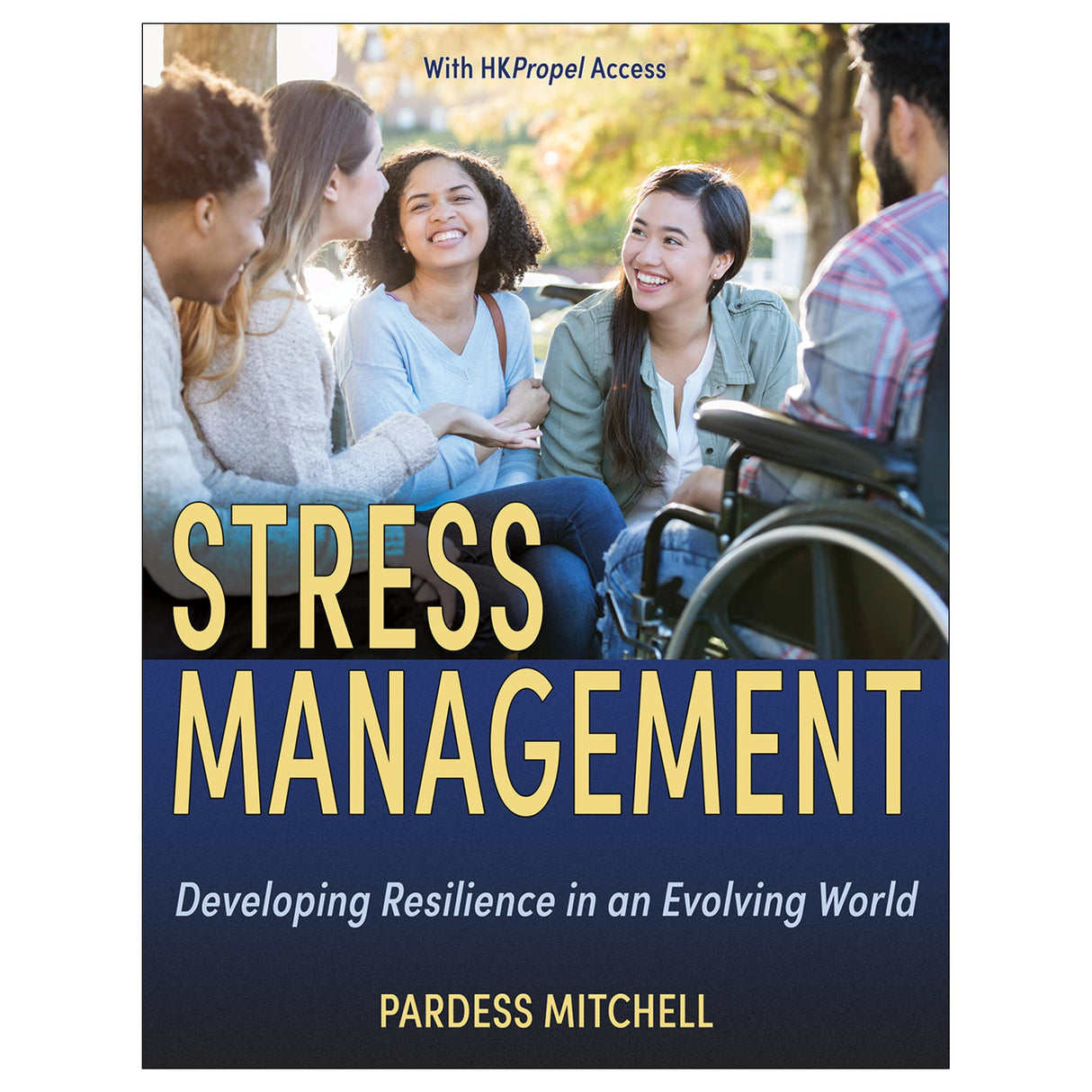Stress Management Ebook With HKPropel Access
Developing Resilience in an Evolving World
Author: Pardess Mitchell
$90.00 USD

Stress Management offers a range of coping strategies that will help students formulate a well-rounded plan to tackle stress from multiple angles—before it occurs, while it is occurring, and after it occurs. That model is centered on four primary pillars:
- Source management—reducing or eliminating stress at its source
- Relaxation—employing techniques for breathing, meditation, and rest to focus the mind and relax the body
- Thought management—adopting a thought process to better manage the stressor
- Prevention—avoiding stress when possible
- Case studies with discussion questions that prompt students to consider real-world scenarios and contemplate ways to solve those stressors
- Research Spotlight elements that present current issues and hot topics related to stress
- Online learning tools, delivered through HKPropel, including audio mini lectures and short interviews, self-discovery activities, chapter quizzes that are automatically graded and provide immediate feedback, and vocabulary flash cards and quizzes
Note: A code for accessing HKPropel is included with this ebook.
Audience
Text for undergraduate health and wellness courses, first-year experience seminars, and general education courses.Chapter 1. Understanding Health and Wellness
Defining Health and Wellness
Influences on Wellness
Dimensions of Wellness
Mind–Body Connection
Proactive Ways to Manage Stress
Summary
Chapter 2. Understanding Stress
Stress and Stressors
Stress Response Stages
Types of Stress
Optimal Levels of Stress
Stress Reactivity
Societal Stress
Summary
Chapter 3. Stress and the Body
Nervous System
Endocrine System
Reproductive System
Cardiovascular System
Enteric Nervous System
Renal System
Musculoskeletal System
Respiratory System
Immune System
Integumentary System
Summary
Part II. Managing Stress Using Dimensions of Wellness
Chapter 4. Physical Wellness
Physical Activity
Healthy Eating
Rest, Relaxation, and Sleep
Summary
Chapter 5. Emotional Wellness
Function of Emotions
Emotions and Stress
Basic Emotions
Managing Emotions
Self-Awareness
Resilience
Self-Esteem
Choosing Optimism
Positive Self-Talk
Laughter
Summary
Chapter 6. Intellectual Wellness
Benefits of Intellectual Wellness
Intellectual Wellness and Stress
Enhancing Intellectual Wellness
Goal Setting and Stress
SMART Goals
Problem Solving
Changing Distorted Thinking
Resilience and a Growth Mindset
Summary
Chapter 7. Social Wellness
Benefits of Social Wellness
Social Support and Stress
Relationships
Interpersonal Communication
Managing and Resolving Conflict
Summary
Chapter 8. Spiritual Wellness
Spirituality and Religion
Components of Spiritual Wellness
Spiritual Wellness and Stress
Altruism
Gratitude
Empathy
Compassion
Summary
Chapter 9. Environmental Wellness
Environmental Wellness and Stress
Personal Surroundings
Nature
Built Environment
Light
Temperature
Air Quality
Noise
Color
Summary
Part III. Practical Strategies for Managing Stress
Chapter 10. Mind–Body Approaches
Yoga
Meditation and Mindfulness
Breath Work
Art Therapy
Movement Therapy
Summary
Chapter 11. Proactive Approaches
Strengths-Based Approach to Stress Management
Identifying Your Triggers
Practicing Self-Care
Planning and Prioritizing
Managing Your Time
Managing Your Resources
Leveraging Support
Knowing When to Seek Professional Help
Summary
All ancillaries are free to adopting instructors through HKPropel.
Instructor guide. Specifically developed for instructors who have adopted Stress Management, the instructor guide includes a sample syllabus, chapter summaries, teaching tips, activities, projects, assignment guides, web links for further exploration, a list of student materials assignable in HKPropel, essay questions and answer guides, citations for articles mentioned in the mini audio lectures, and printable classroom material.
Test package. Contains over 330 questions in true-false, fill-in-the-blank, essay and short-answer, matching, multiple-choice, and multiple-response formats. The files may be downloaded for integration with a learning management system or printed for use as paper-based tests. Instructors may also create their own customized quizzes or tests from the test bank questions to assign to students directly through HKPropel. Multiple-choice and true-false questions are automatically graded, and instructors can review student scores in the platform.
Chapter quizzes. Contains ready-made quizzes (10 questions each) to assess student comprehension of the most important concepts in each chapter. Each quiz may be downloaded or assigned to students directly through HKPropel. The chapter assessments are automatically graded, and instructors can review student scores in the platform.
Presentation package. Features more than 240 PowerPoint slides of text, artwork, and tables from the book that can be used for class discussion and presentation. The slides in the presentation package can be used directly within PowerPoint or printed to make handouts for students. Instructors can easily add, modify, and rearrange the order of the slides.
Instructors also receive access to all student materials in HKPropel. For Stress Management, this includes audio mini lectures with accompanying quizzes, self-discovery worksheets, chapter review questions, vocabulary study activities, and vocabulary review quizzes.









